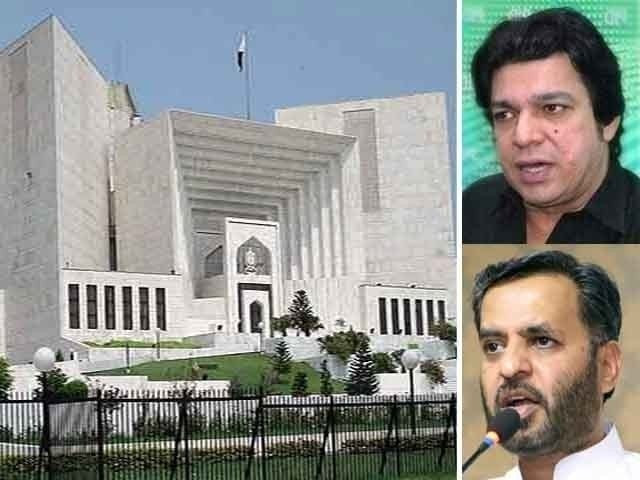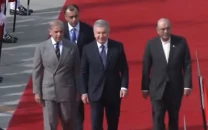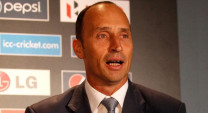SC accepts Faisal Vawda, Mustafa Kamal's 'unconditional' apology in contempt case
Apex court has withdrawn court of contempt notices issued to both parliamentarians

The Supreme Court (SC) on Friday accepted Senator Faisal Vawda and Member of the National Assembly (MNA) Syed Mustafa Kamal's unconditional apologies in the contempt case filed against them.
The contempt case against Vawda and Kamal was heard by a three-judge bench led by Chief Justice Qazi Faez Isa.
Both politicians had delivered strongly worded press conferences criticising the judiciary earlier in May. Vawda emphasised the necessity of evidence before levelling allegations, while Kamal aimed to establish ethical standards for judges, insisting that justice could "only be bought".
On June 26, Senator Faisal Vawda submitted an apology to the SC of Pakistan in a contempt of court case.
Vawda, in his second written response to the court, expressed his utmost respect for the judiciary.
Vawda stated, "Following the court proceedings on June 5, I met with religious scholars to understand the role of a senator. I was advised to stand by justice, even if it is against my own kin."
The Supreme Court of Pakistan (SC) has also issued contempt notice to 34 TV channels on June 4 for airing 'anti-judiciary press conferences' of Senator Faisal Vawda and MQM-P leader Mustafa Kamal.
As the hearing for the case commenced today, CJP Isa asked Senator Vawda, "Have you also apologised?"
Vawda responded in affirmative saying he had submitted an unconditional apology.
Mustafa Kamal's counsel Barrister Farogh Naseem then stated that his client had also apologised and expressed regret during a press conference.
Meanwhile, Advocate Faisal Siddiqi appeared before the court on behalf of 26 television channels.
The court inquired about the clients' responses.
The CJP remarked, "None of your clients[channels] have submitted any response yet, only lawyers have"
He questioned how Siddiqi could represent media organisations when not a single media entity had submitted a written response.
Siddiqi explained that media organisations had not received show-cause notices.
"Do you want show-cause notices to be issued to the media organisations?" Justice Isa inquired.
Justice Aqeel Abbasi added, "At least a responsible officer from the media organisations should have signed the response."
Chief Justice Isa expressed dissatisfaction with Siddiqi's compliance with court orders.
Siddiqi responded that representatives from all the channels were present in court.
"In a contempt of court case, the response must be signed by the channels," CJP Isa emphasised.
Siddiqi responded that if had there been a show-cause notice, the response would have been signed by the channels.
Chief Justice Isa remarked, "Do you not like the Constitution? I thought you would start[your argument] with the Constitution."
Explaining his stance further, CJP Isa continued, "If someone calls another a thief, and the media says we are only reporting, is that right? Should such kind of free media be allowed or not? Freedom of the press and freedom of expression are two different things."
Siddiqi argued that defining press freedom has been a 200-year effort.
Chief Justice Isa countered, "Why not start from 1400 years ago? Do you not like 1400 years? Are you mentioning 200 years because that is when America gained independence?"
Siddiqi responded that he mentioned 200 years because that marked the beginning of modern constitutions.
Chief Justice Isa directed Siddiqi to read the preamble of the Constitution, which begins with "In the name of Allah, the Most Gracious, the Most Merciful."
He questioned where the mention of the modern age was in the Constitution.
"As TV channels, you broadcasted their speeches, now you claim nothing was done," he added.
The court maintained that in other countries press conferences are not broadcasted live directly but edited first.
"Now you will not give the example of America," the chief justice noted.
"You admitted contempt occurred, so we issue a notice. This will now lead to contempt proceedings based on your admission."
Siddiqi assured, "I have complete trust in you, and I will abide by whatever decision you make."
The CJP retorted, "Do not give us certificates of trust. Is this a constitutional argument that you trust us? The court wants responses signed by the channels."
He then warned, "If you play games with us, we will not give you a chance. We will deal strictly with you. These responses are signed by you; we can issue a contempt notice against you as well."
Siddiqi at this point of the hearing accepted full responsibility for the response.
"You said at least one press conference was contemptuous," the CJP said as the arguments continued.
Siddiqi clarified, "I said prima facie it was contempt." CJ Isa admonished, "Do not say such things if you did not mean it."
Chief Justice Isa pointed out inconsistencies in Siddiqi's written response, questioning if Siddiqi had indicated disagreement with the press conference statements while broadcasting them.
"You wrote in your response that you have to cover press conferences. If a madman holds a press conference in an asylum, is it your duty to cover it?" he questioned.
"Press conference speakers admitted their mistake, but you claim it is your duty to broadcast it," he noted.
Justice Aqeel Abbasi, while addressing Siddiqi queried that if anyone claims to "represent the public", will the channels broadcast their pressers.
CJP added, "Where are you getting these ideas from? PEMRA or any international convention?"
Siddiqi argued that there is a difference between facts and truth.
CJP Isa remarked, "I will learn something new from you today." to which Siddiqi humbly responded, "How can I teach you anything? The context of truth is broad."
Chief Justice Isa commented, "You are standing before us; is this reality or truth?"
Responding to CJP's remarks, Siddiqi said, "A lawyer's duty is to serve the client's interest."
Siddiqi agreed to submit responses signed by the channels.
"We will not give you a chance. Do not tell us what to do. You will not make money by speaking the truth; abuse has become common now. We did not hear such things in our childhood, now they are on TV."
"You invite people on TV who have no knowledge of the law. It would be better if a medical expert talks about medicine and a lawyer about the law," Justice Abbasi noted.
Siddiqi acknowledged, "Your suggestions are very good." CJP Isa clarified, "We are not giving suggestions; we want the law to be enforced."
Referring to Vawda and Kamal's presser, the court lambasted the TV channels for airing everything.
"If you don't create a spectacle, how will you make money?"
The CJP continued to comment on Siddiqi's stance quoting "modern communities" regarding freedom of speech, he said "These well-educated people mention America but not the Quran and Hadith. Can anything be worse than backbiting?
The court maintained that thenation had lost interest in religion and mentioned that European countries are still comparatively very cautious about what they are broadcasting.
The arguments then shifted to Vawda and Kamal's apologies.
CJP Isa asked, "Should someone who apologises be forgiven? We do not enjoy contempt proceedings, but society is being destroyed."
Justice Abbasi mentioned that PEMRA sometimes imposes restrictions on court reporting.
The Attorney General Pakistan (AGP) Mansoor Usman Awan reported additional contemptuous press conferences.
The court inquired about who held those press conferences.
"PTI's Rauf Hasan used derogatory words against you and the Chief Justice of the Islamabad High Court," The AGP replied.
CJP Isa asked, "What was said in the press conference? Is Rauf Hasan the brother of Fawad Hasan Fawad?"
The AGP answered in the affirmative.
"The SC had ordered Fawad Hasan Fawad to pay all dues from his pocket. We later annulled that decision, which might have upset Rauf Hasan. I am not in favour of contempt proceedings for comments about me," the chief justice said.
"Someone once said I should be shot in a public square; no action was taken on that threat. My wife did file a police complaint, but the current case was initiated by a fellow judge. If someone's name is mentioned, the media beeps it out."
The court then directed Faisal Siddiqi to consult his client.
After a short break, the hearing resumed.
The CJP announced, "We are withdrawing the contempt notices against Senator Faisal Vawda and Mustafa Kamal. We respect the parliament and expect you to respect the judiciary as an institution."
Responding to the decision, Vawda assured, "This will not happen again. A judge called me a proxy, and it caused me great distress."
"Had you not made the first statement, the second would not have followed," CJP Isa responded.



















COMMENTS
Comments are moderated and generally will be posted if they are on-topic and not abusive.
For more information, please see our Comments FAQ